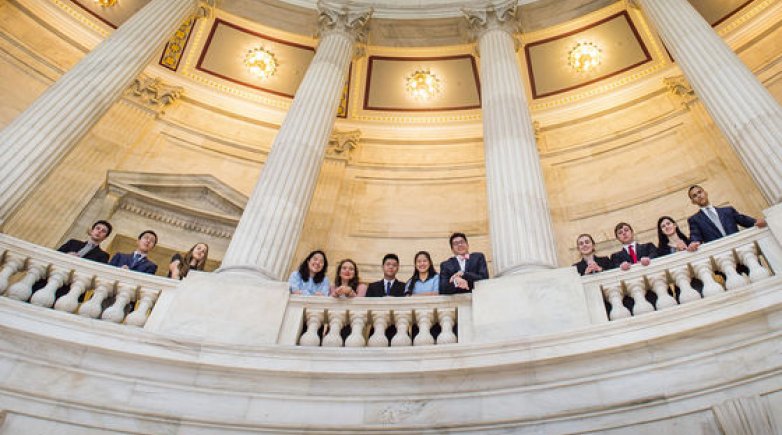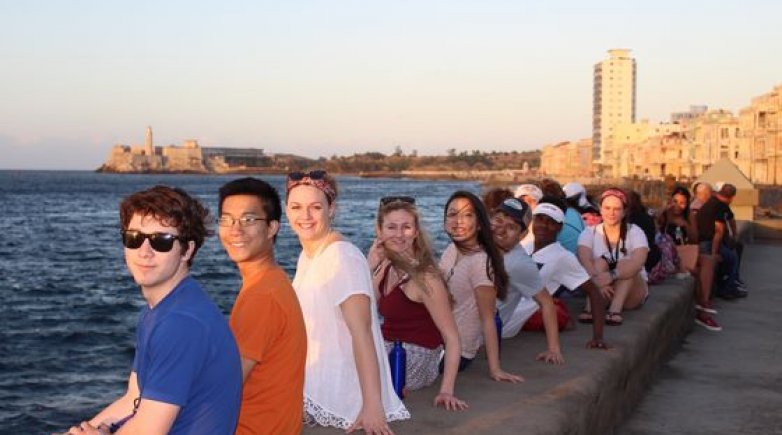A Capitol Experience
The Washington Intern Program at 50.
2016 spring interns take a short break in the Rotunda of the Russell Senate Office Building.
THE WASHINGTON INTERN PROGRAM AT 50
By Lynn Horowitch ’81; P’19
Their days included tweeting on behalf of a congressman, shadowing a senator for a day, and attending a charity ball. One Exonian got a chance to speak on the phone with former Massachusetts Rep. Barney Frank, another met an Olympic gold medalist, and a third rode the Russell Building tram with Arizona Sen. John McCain.
For the 12 seniors who spent spring term working in the nation’s capital, each assigned to the office of a senator or representative, Exeter’s Washington Intern Program provided hands-on access to the inner workings of our government. Days were spent carrying out traditional intern tasks: writing memos, attending briefings, answering constituent mail and phone calls, sorting press clippings, giving tours of the Capitol. In the evenings, they explored the city and also read English assignments, wrote in their journals, and attended seminars with accomplished Exeter alumni and parents. In the process, these Exonians discovered, on the program’s 50th anniversary, why it’s worth missing senior spring at Exeter. 
Emerita History Instructor Barbara Eggers ’66 (Hon.); P’89, P’91 served as faculty adviser for spring 2016. She says, ”The students gain an appreciation for the amount of work that has to be done. They look at the schedule for the elected official and are blown away.” The volume of correspondence an elected official receives underscores for Exonians why ”a team approach is necessary,” adds Eggers.
From their base in the Capitol Hill Hotel on a quiet street of row houses in the shadow of the Capitol, the students made the most of their experiences. And if history is any guide, the program will provide a lasting legacy in their lives, as it has done for participants for the past 50 years.
When Exeter’s History Department voted in 1966 to establish the Washington Intern Program, the faculty may not have anticipated two things. First, that the program would still be going strong today. The WIP had fairly humble beginnings that year, when an enterprising student, Meir Ribalow ’66, entreated the faculty to allow him to intern in the office of Sen. Jacob Javits, R-N.Y. Ribalow had worked for Javits the previous summer and wanted to return during his senior spring and earn academic credit. His adviser, longtime instructor and coach Werner Brandes, recalls that the History Department ”liked the concept of a service program in Congress.” So with help from Dick Schrader ’51, Hammy Bissell and numerous Exeter alumni in Washington, the program was born.
The WIP became a signature Exeter program, and it wasn’t long before Andover joined in. Up until 2002, both schools sent contingents to Washington each spring. Upward of 30 students would head south, bunking at the Bellevue Hotel on Massachusetts Avenue near Union Station. For the past 14 years, Exeter has been the only secondary school in the nation to run an intern program. Now competing with numerous global travel options — Exeter students can study in 17 locales across five continents — the Washington Intern Program continues to attract an annual cohort that perpetuates the program. ”Exonians do such good work that interns are always wanted the next year,” Eggers says. ”The various offices will help us find new positions.”
In addition to Eggers and Brandes, who holds the record for number of years as a WIP adviser, several of Exeter’s best-loved and longest-tenured teachers have served as resident advisers: Eggers, Jack Herney, Andy Hertig, Bob Grey, Norval Rindfleisch, Bill Bolden and Harvard Knowles.
While a number of Exonians have gone into public service, those who sat in the Latin Study and voted to start the program might be surprised at the breadth of ways that the WIP has helped students develop professionally. For the 700+ participants, the Washington Intern Program has provided a base — a first professional experience, the chance to explore a city, the ability to navigate the labyrinthine halls of the Capitol complex — that has served as a stepping-stone to a wide array of experiences in the public and private sector. 
As an active member of Exeter’s Democratic Club and an avid spectator in the Kerry vs. Bush election in 2004, Marty Maull ’06 wanted to find out what happens after people are elected. A native of Exeter who attended the Academy as a day student, Maull was particularly interested in working for Sen. Russ Feingold, D-Wis. Feingold’s office had never had an Exeter intern, but after some finagling, Maull had her position. ”The staffers didn’t understand why a high school student could be an intern,” Maull says. ”I was thrown in with college juniors and seniors and had to prove myself.” She quickly learned important lessons about professionalism. ”One of the things I learned: Don’t wear flip-flops to the office!” she says.
Maull was surprised by how long and involved the legislative process is. ”I definitely learned how the sausage is made,” she says. ”I thought it would be like The West Wing, with things happening each month, but it takes years sometimes.” Maull studied Wisconsin facts and figures so she could converse well with visitors on Capitol Building tours she led. ”Of course, visitors want to see the statues from Wisconsin in Statuary Hall,” she explains. Connecting with constituents was a perk of the job, and Maull found that she loved reading constituent mail. She says, ”People go to their congresspeople for a lot of things: business disputes, adoption, entry into armed forces academies. They share so many intimate details.”
When she graduated from Smith College in 2010 with a degree in economics, job openings were scarce because of the global recession. But Maull’s Senate experience led to her hiring by the Inspector General’s office at the FDIC. Now a special agent in the FDIC’s Atlanta office, Maull credits the intern program with providing an entrée to her role.
The city of Washington itself was the draw for Max Fenkell ’10, now a legislative coordinator for the Ford Motor Company. A native of Philadelphia, Fenkell worked for Sen. Jay Rockefeller ’54, D-W. Va., whose office took an Exeter intern each spring of his term from 2009 to 2015. Fenkell quickly developed his intern strategy: Never say no; be willing to do anything. That attitude led him to be part of a pool of photographers from national newspapers including The New York Times and USA Today jockeying for position to take a picture of Neil Armstrong at a Senate Commerce Committee hearing. ”My office was desperate for someone to take photos and I was an OK photographer,” Fenkell says. ”Out of 100 pictures I took, I think at least one came out!”
Fenkell loved the size and pace of D.C. and recalls checking in one minute before curfew every night during his senior spring, after he’d explored Georgetown, Dupont Circle, the U Street Corridor and other neighborhoods. Fenkell says, ”If I hadn’t done the intern program I would never have found myself in D.C.” And the intern experience helps him in his work for Ford on federal policy. ”My job calls for research on legislation and reaching out to members on the Hill,” he says. ”I’m building on my intern experience and now am seeing how a Fortune 10 company operates in D.C.”
Like Fenkell, Nicolas Coleman ’16 also found the value of a positive attitude this spring. Coleman worked as an intern for Sen. Mark Warner, D-Va., picking up important lessons. ”The first responsibility is to do anything staffers ask: pick up a sandwich, attend briefings,” he says. While the tasks were sometimes mundane, several moments were thrilling. ”I went to a briefing in the Kennedy Caucus Room, on the role of the Senate in holding confirmation hearings for the Supreme Court,” Coleman says. ”Senators Orrin Hatch and Patrick Leahy took turns speaking, and at the end, Leahy presented Ted Kennedy’s Senate Judiciary Committee gavel to his widow. It was really interesting to be a part of, both for its contemporary and historic significance.”
Serena May ’08, who worked in the office of Rep. David Wu, D-Ore., has found many commonalities between her internship and her current role as a global strategist in marketing with McCann Worldgroup. ”It all comes down to communications,” she says. ”As an intern, I drafted letters and answered phone calls, the basics. It was part of supporting my congressman and contributing in a small way to decisions that were made. Now I’m doing that, but at a different level, helping McCann Worldgroup integrate digital into everything the company’s agencies do for clients.”
May has found that communications, whether for a U.S. representative or for a global agency, involves understanding the forces that are at work on the public. ”Marketing is all about how you play a part in cultures and understanding the implications of the news, grass roots, all different influences,” she says. As an intern, May learned how these forces influence public policy and now applies this knowledge to help brands play a meaningful role in people’s lives.
May also found that her WIP experience gave her a great sense of confidence: ”It was a rare opportunity to have exposure to leaders. I was less afraid to be a junior person at a company because of that.”
The program inspired a course of study for May’s classmate, Bassam Gergi ’08. Now finishing his second year at Yale Law School, Gergi interned in 2008 with then-rookie Sen. Barack Obama.
Gergi’s placement with Sen. Obama was the result of a longstanding friendship between Emeritus History Instructor Jack Herney ’46, ’69, ’71, ’74, ’92, ’95 (Hon.) and Pete Rouse, who worked on Capitol Hill for years and ultimately as chief of staff to Senate Democratic leader Tom Daschle and finally as chief of staff to Sen. and then President Obama. Herney met Rouse on Sen. Tom McIntyre’s D-N.H. softball team in 1972 when he was in Washington with the interns, ”Pete was a fabulous shortstop,” says Herney, but more important to Exeter, he became a supporter of the WIP, ”the best friend the program had, because of his huge Rolodex” Herney says. ”He always found an office for us when needed.”
After graduating from Exeter, Gergi spent six months as a field organizer for Obama in Rochester, New Hampshire. After Obama’s election to the presidency, Gergi spent another six months working at the White House as an assistant in the Office of Management and Budget, whose director at the time was Peter Orszag ’87.
For Gergi, interning in the Senate put him in the company of other ”public-spirited young people.” He continues, ”In an age of intense cynicism about politics, this was refreshing and inspiring, and it heavily contributed to my decision to defer university for a year to work on the Obama campaign and in the White House, which, in turn, contributed to my pursuing a master’s degree in comparative government and then law school.”
This year’s interns have taken full advantage of the extra activity in Washington during an election year. When Ted Cruz and John Kasich abandoned their bids for the Republican nomination for president following their losses in the Indiana primary in early May, it had a direct effect on Anastasia Kurochkina ’16. As an intern for Sen. Dan Coats, R-Ind., Kurochkina, who is from Moscow and had never been to Washington, D.C., helped sort through press clips. In the days leading up to and following the Indiana primary, the state was all over the news, and Kurochkina spent up to five hours a day reading the coverage in the national press.
Kurochkina, who will attend Scripps College, has found that her time on Capitol Hill and her academic experience have enhanced each other. With Congress out of session, she attended a hearing on Tunisia. She notes, ”If I hadn’t taken the Contemporary Middle East class with [History Instructor] Mr. [Michael] Golay, I wouldn’t have fully understood the hearing on Tunisia. It’s having the opportunity to experience both that makes it multidimensional.”
One of the perks of being an intern is seeing that politics and government are handled by real people. As Kurochkina says, ”It’s not an abstract policy debate, and there isn’t always a right answer. The people who do this work are passionate. They also get nervous and frustrated at times. It’s very humanizing to see.”
Washington interns give up their last weeks on the Exeter campus and perhaps their only moments to glide through an Exeter spring. Is it worth it? When asked near the end of their time in Washington if they would do it again, all 12 interns from the class of 2016 instantly raised their hands in the affirmative.
As Bassam Gergi says, ”The Washington Intern Program is a once-in-a-lifetime opportunity to get a firsthand look into the day-to-day realities of life on Capitol Hill, and if you have any inclination that this may be the type of work you’d like to do, then you owe it to yourself to give it a shot.”
And will it someday lead to an intern elected to Congress?
Coleman will attend Duke University in the fall. He is considering political science or public policy as a major. While he isn’t sure of his long-term career goals, he notes that when he gave tours of the Capitol, visitors always asked if he wanted to run for public office. His conclusion? ”It wouldn’t be a bad job to have!”


